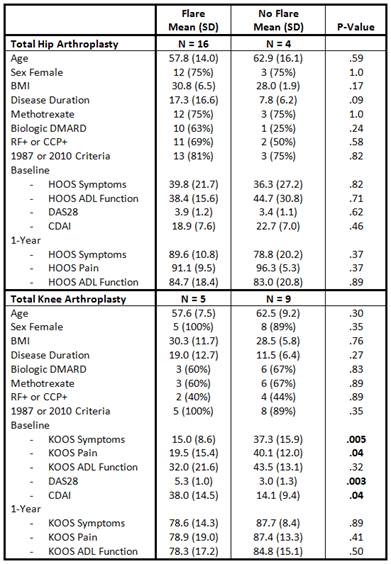Session Information
Date: Monday, November 14, 2016
Title: Rheumatoid Arthritis – Clinical Aspects - Poster II: Co-morbidities and Complications
Session Type: ACR Poster Session B
Session Time: 9:00AM-11:00AM
Background/Purpose:
Post-op flares are frequent for RA patients after total hip (THA) and total knee arthroplasty (TKA), when medications are discontinued to mitigate infection risk. The association of flares and patient-reported outcomes (PROs) at 1 year after THA and TKA is unknown. We aimed to describe the relationship of post-op flares with 1 year THA/TKA outcomes.Methods
: Post-op flares were identified in patients with RA undergoing TKA/THA by self-report. Patients completed a questionnaire comprised of a subset of questions from the RA Flare Questionnaire, administered weekly for 6 weeks after arthroplasty. Flare was defined by concordance between patient report (“Are you in a flare? Yes/No”), plus MD assessment of patient-reported survey data including patient reported swollen and tender joints and Rapid III. Pain and function scores (HOOS/KOOS) and disease characteristics were collected at baseline before surgery and after one year. Baseline characteristics and HOOS/KOOS scores were compared using t-tests and chi-square.Results: One-year outcome scores were available for 20 THA and 14 TKA patients, predominantly women with established RA (Table 1). Baseline DAS-28 and CDAI were higher in TKA flarers, but not THA flarers. 20 (59%) were using biologic medications that were stopped for surgery, and 21 (61%) were flaring before or within six weeks of surgery. MTX use was similar in all groups. Despite this, flarers and non-flarers both had excellent pain and function outcomes at 1 year. There was no statistically or clinically significant difference between flarers and non-flarers, despite poorer pre-operative KOOS scores and higher disease activity for TKA flarers.
Conclusion: Although post-op flares were frequent in RA patients undergoing THA/TKA, pain and function outcomes were similar at 1 year in those who reported flare or not. While these preliminary data are reassuring that perioperative flares do not appear to affect long term functional outcomes, further validation in a larger sample of patients is needed, as well as more study in different settings to increase confidence in these findings. This study was supported by the Clinical Translational Science Center (CTSC) (UL1-TR000457-06)
To cite this abstract in AMA style:
Goodman SM, Bartlett SJ, Cummings R, Andersen K, DiCarlo EF, Figgie MP, Donlin LT, Orange DE, Bykerk VP. RA Flare after Total Hip and Total Knee Arthroplasty: Preliminary Outcomes at 1 Year [abstract]. Arthritis Rheumatol. 2016; 68 (suppl 10). https://acrabstracts.org/abstract/ra-flare-after-total-hip-and-total-knee-arthroplasty-preliminary-outcomes-at-1-year/. Accessed .« Back to 2016 ACR/ARHP Annual Meeting
ACR Meeting Abstracts - https://acrabstracts.org/abstract/ra-flare-after-total-hip-and-total-knee-arthroplasty-preliminary-outcomes-at-1-year/

